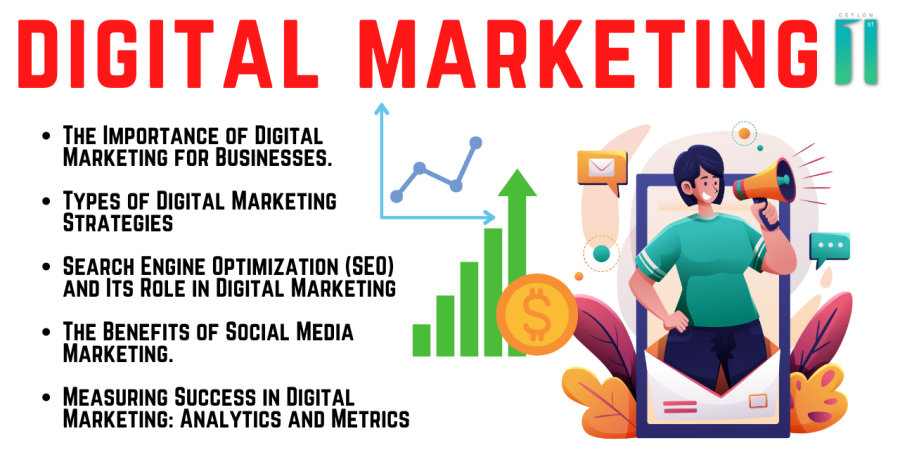Unlocking the Power of Digital Marketing: Strategies, Tools, and Analytics for Business Growth
In today’s digital age, businesses must stay ahead of the curve when it comes to marketing. With the rise of technology and social media, traditional marketing tactics are no longer enough to attract and retain customers. Digital marketing offers a vast array of tools and strategies to help businesses reach their target audience and drive growth. However, with so many options available, it can be overwhelming for businesses to know where to start.
In this article, we will explore the power of digital marketing and provide strategies, tools, and analytics to help businesses unlock its full potential. We will examine various digital marketing strategies, including social media marketing, search engine optimisation, and email marketing, and explore how they can be used to drive growth and reach new customers. We will also delve into the tools and analytics available to measure the success of digital marketing campaigns, including website traffic, conversion rate, and engagement metrics.
The Importance of Digital Marketing for Businesses
In today’s world, digital marketing has become an essential aspect of running a successful business. With the majority of consumers turning to the internet to research products and services, having a strong online presence is critical. Digital marketing offers a wide range of benefits to businesses of all sizes, including increased visibility, brand awareness, and customer engagement.
One of the main advantages of digital marketing is the ability to reach a large audience at a relatively low cost. Traditional marketing methods, such as print advertising and direct mail campaigns, can be expensive and may not be as effective in reaching a broad audience. Digital marketing allows businesses to reach a global audience through various online channels, including social media, email marketing, and search engine marketing.
Another benefit of digital marketing is the ability to target specific audiences based on their demographics, interests, and behaviours. This targeted approach allows businesses to tailor their marketing efforts to reach the right people with the right message. For example, a business that sells athletic apparel can target their marketing to individuals who have an interest in fitness and exercise, increasing the likelihood of converting these leads into customers.
Digital marketing also provides businesses with the opportunity to engage with customers in real-time. Social media platforms, in particular, allow businesses to connect with their audience on a personal level and build relationships that can lead to increased loyalty and sales. By regularly posting relevant content and engaging with their followers, businesses can create a strong online presence that encourages customer interaction and feedback.
Search engine optimisation (SEO) is another critical component of digital marketing that can help businesses increase their online visibility and drive more traffic to their website. By optimising their website and content for search engines, businesses can improve their rankings in search results, making it easier for potential customers to find them online. This increased visibility can lead to higher website traffic, increased brand awareness, and ultimately, more sales.
Digital marketing is essential for businesses looking to stay competitive in today’s digital landscape. With its ability to reach a broad audience at a relatively low cost, target specific demographics, engage with customers in real-time, and improve online visibility through SEO, digital marketing offers numerous benefits to businesses of all sizes. By incorporating digital marketing into their overall marketing strategy, businesses can increase their brand awareness, reach new customers, and ultimately, drive business growth.
Types of Digital Marketing Strategies
There are various types of digital marketing strategies that businesses can use to promote their products and services online. Each strategy has its unique benefits and can be customised to suit the needs of different businesses. Here are some of the most common types of digital marketing strategies:
1. Search Engine Optimisation (SEO): SEO involves optimising a website and its content to improve its visibility and ranking in search engine results pages. By incorporating relevant keywords and optimising website structure, businesses can improve their organic search traffic and attract more potential customers.
2. Pay-per-click (PPC) advertising: PPC advertising involves placing ads on search engine results pages or other websites and paying each time a user clicks on the ad. This type of advertising can be highly targeted and allows businesses to control their advertising spend and track their return on investment (ROI).
3. Content marketing: Content marketing involves creating and sharing valuable, relevant, and consistent content to attract and retain a clearly defined audience. By creating high-quality content that resonates with their target audience, businesses can establish themselves as thought leaders and attract more leads and customers.
4. Social media marketing: Social media marketing involves using social media platforms, such as Facebook, Instagram, and Twitter, to promote a business’s products or services. By creating engaging content and building a community of followers, businesses can increase brand awareness and drive customer engagement.
5. Email marketing: Email marketing involves sending targeted emails to potential and existing customers. This type of marketing can be highly personalised and allows businesses to promote their products or services directly to individuals who have expressed interest in their brand.
6. Influencer marketing: Influencer marketing involves partnering with social media influencers to promote a business’s products or services. By leveraging the influencer’s audience and credibility, businesses can reach new customers and increase brand awareness.
7. Affiliate marketing: Affiliate marketing involves partnering with other businesses or individuals to promote a business’s products or services in exchange for a commission. This type of marketing can be highly targeted and can help businesses reach new audiences and increase their sales.
there are various types of digital marketing strategies that businesses can use to promote their products and services online. By incorporating these strategies into their overall marketing plan, businesses can improve their online visibility, attract new customers, and increase their sales. Each strategy has its unique benefits, and businesses should choose the ones that are most relevant to their target audience and business objectives.
Search Engine Optimisation (SEO) and Its Role in Digital Marketing
Search Engine Optimisation (SEO) is a critical component of digital marketing. It involves optimising a website and its content to improve its visibility and ranking in search engine results pages (SERPs). By ranking higher in search results, businesses can attract more organic traffic to their website and increase their chances of converting those visitors into customers. Here’s a closer look at SEO and its role in digital marketing.
First and foremost, SEO is all about relevance. Search engines like Google use complex algorithms to determine which websites and pages are most relevant to a particular search query. By optimising a website and its content for specific keywords and phrases, businesses can improve their chances of ranking higher in search results when users search for those terms.
Another critical aspect of SEO is the user experience. Search engines not only consider the relevance of a website’s content but also how user-friendly it is. Factors like website speed, mobile-friendliness, and site structure all play a role in how search engines rank websites. By optimising these elements of a website, businesses can improve the user experience and increase their chances of ranking higher in search results.
One of the most significant benefits of SEO is that it can be highly targeted. By focusing on specific keywords and phrases, businesses can attract users who are already interested in their products or services. These users are more likely to convert into customers, making SEO a highly effective form of digital marketing.
In addition to targeting specific keywords, SEO can also be localised. Local SEO involves optimising a website and its content for specific geographic locations, making it easier for businesses to attract customers in their local area. By using location-specific keywords and creating local business listings, businesses can increase their visibility to users who are searching for products or services in their area.
One of the most significant advantages of SEO over other forms of digital marketing is its long-term effectiveness. Unlike paid advertising, which stops generating traffic as soon as the ad budget runs out, SEO can continue to drive traffic to a website for months or even years after the initial optimisation. This makes it an excellent investment for businesses looking to build a sustainable online presence.
Search Engine Optimisation (SEO) plays a vital role in digital marketing. By optimising a website and its content for specific keywords, businesses can improve their visibility in search engine results pages and attract more organic traffic to their website. Additionally, by focusing on the user experience and localising their SEO efforts, businesses can improve their chances of attracting and converting potential customers. With its long-term effectiveness and targeted approach, SEO is a valuable investment for any business looking to build a strong online presence.
The Benefits of Social Media Marketing
Social media has become a ubiquitous part of modern life, and it’s also become an essential component of digital marketing. Businesses of all sizes can use social media platforms to reach their target audience, build brand awareness, and engage with customers. Here are some of the benefits of social media marketing.
One of the most significant benefits of social media marketing is the ability to reach a massive audience. Platforms like Facebook, Twitter, and Instagram have billions of users, and businesses can use these platforms to target specific demographics with their advertising campaigns. This can help businesses reach new customers and increase brand awareness./
Social media marketing also allows businesses to engage with their customers in real-time. By monitoring social media platforms, businesses can respond to customer inquiries, address complaints, and provide customer support. This can help build trust with customers and foster long-term relationships.
Another benefit of social media marketing is the ability to create highly targeted advertising campaigns. Platforms like Facebook and Instagram allow businesses to target specific demographics, interests, and behaviours, ensuring that their ads are seen by users who are most likely to be interested in their products or services. This can result in higher conversion rates and a better return on investment for businesses.
Social media marketing can also be highly cost-effective. While traditional forms of advertising like television and print can be expensive, social media advertising can be relatively cheap. Businesses can set a budget for their advertising campaigns and target specific demographics to ensure that they’re getting the most out of their advertising dollars.
One of the most significant benefits of social media marketing is its ability to build brand awareness. By creating engaging content and interacting with customers on social media platforms, businesses can increase their visibility and create a strong brand image. This can help build brand loyalty and increase customer retention.
Finally, social media marketing can be highly measurable. Platforms like Facebook and Twitter offer powerful analytics tools that allow businesses to track the performance of their social media campaigns. This data can be used to make informed decisions about future campaigns and optimise existing campaigns for better results.
Social media marketing offers a wide range of benefits for businesses. From reaching a massive audience to building brand awareness and engaging with customers, social media platforms have become essential tools for businesses of all sizes. By leveraging these platforms to create targeted advertising campaigns, businesses can increase their ROI, build brand loyalty, and drive long-term success. With its cost-effectiveness and measurability, social media marketing is a must for any business looking to compete in today’s digital landscape.
Measuring Success in Digital Marketing: Analytics and Metrics
One of the advantages of digital marketing is the ability to measure and analyse the success of campaigns through analytics and metrics. By collecting data on user behaviour and engagement, businesses can gain valuable insights into how their marketing efforts are performing and make informed decisions about future campaigns.
One of the most critical metrics for measuring success in digital marketing is website traffic. By tracking the number of visitors to a website, businesses can determine whether their marketing campaigns are driving traffic and whether their website is optimised for user engagement. Other website metrics, such as bounce rate and time spent on site, can provide insight into how users are interacting with the website and help identify areas for improvement.
Another essential metric for measuring success in digital marketing is conversion rate. Conversion rate refers to the percentage of visitors to a website who take a specific action, such as making a purchase or filling out a form. By tracking conversion rate, businesses can determine whether their marketing efforts are leading to the desired outcomes and identify areas for improvement in the conversion funnel.
Social media metrics, such as engagement rate and reach, can also provide valuable insights into the success of social media campaigns. Engagement rate measures how users are interacting with social media content, such as likes, comments, and shares. Reach measures the number of users who see a social media post. By tracking these metrics, businesses can determine whether their social media campaigns are resonating with their audience and identify opportunities to improve engagement and reach.
Email marketing metrics, such as open rate and click-through rate, can also provide valuable insights into campaign success. Open rate measures the percentage of users who open an email, while click-through rate measures the percentage of users who click on a link within an email. By tracking these metrics, businesses can determine whether their email marketing campaigns are engaging their audience and driving traffic to their website.
In addition to these specific metrics, businesses can also use analytics tools to track broader trends and patterns in user behaviour. For example, Google Analytics can provide insights into where website traffic is coming from, how users are interacting with a website, and what content is driving the most engagement. By using these insights to inform marketing decisions, businesses can optimise their campaigns for better results and drive long-term success.
Measuring success in digital marketing is essential for businesses looking to drive growth and achieve their marketing goals. By tracking metrics and analysing user behaviour, businesses can gain valuable insights into how their marketing efforts are performing and make informed decisions about future campaigns. From website traffic and conversion rate to social media engagement and email marketing, there are a wide range of metrics and analytics tools available to help businesses measure success in digital marketing. By leveraging these tools to optimise their campaigns, businesses can achieve long-term success in the digital landscape.
CEYLON FIRST



Leave feedback about this